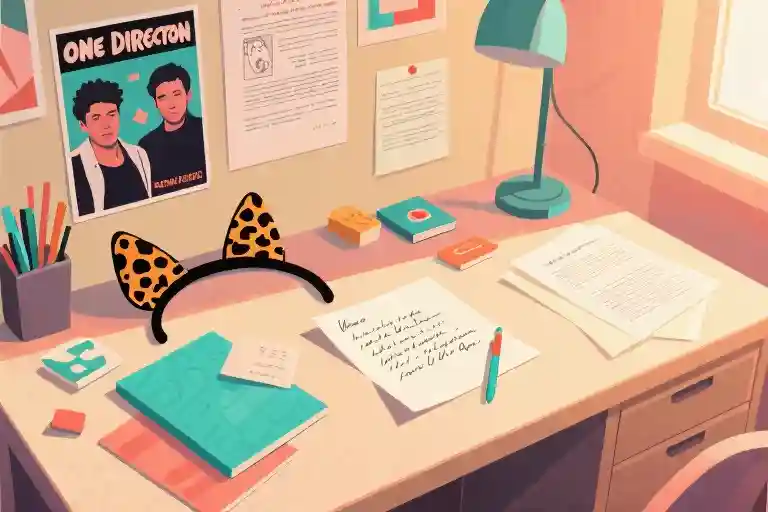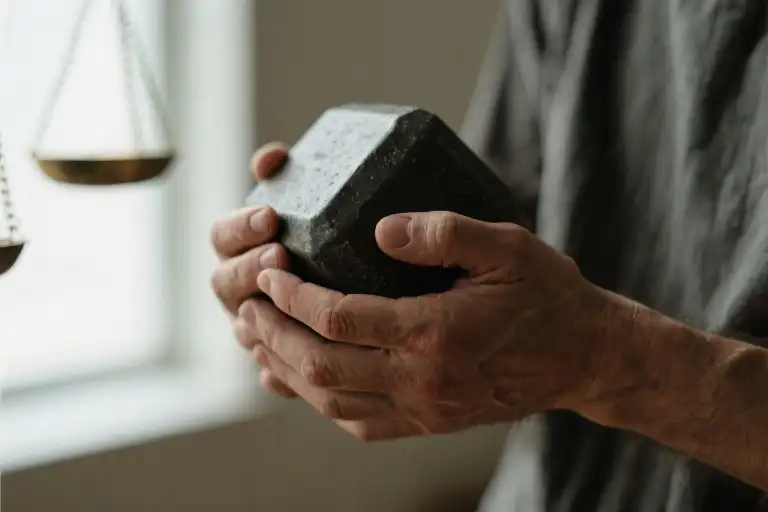If my 15-year-old self could see me now, she’d probably laugh at how seriously I’m taking this whole ‘writing a letter to my past self’ thing. Back then, the only letters I cared about were the ones from One Direction fan clubs (yes, the physical mail kind – remember those?).
The version of me who thought leopard-print cat ears were high fashion and that ranking in the bottom 25% of my class was a personality trait wouldn’t believe where life’s taken us. Not that she’d care much – she was too busy perfecting that peace-sign-and-tongue-out pose for yet another Instagram post with the squad.
What I wish I could tell that girl through the haze of hairspray and teenage angst is this: your report card doesn’t define you, but those friendships might just outlast your algebra knowledge. Keep taking those ridiculous photos even when adults roll their eyes. That unshakable (if slightly delusional) confidence that lets you wear whatever you want without overthinking? Protect that at all costs.
This isn’t one of those ‘if I knew then what I know now’ lectures. God knows 15-year-old me would’ve scrolled right past that. Consider it more like a survival guide from someone who’s just far enough ahead to see the patterns, but still remembers exactly how it felt to be drowning in zit cream and school drama.
The leopard ears? We’ll never live those down. The D-minus in chemistry? Surprisingly irrelevant five years later. That time you and Jess spent an entire sleepover analyzing whether Harry winked at you or just had something in his eye during the concert footage? Priceless.
What I’m trying to say is: you’re doing better than you think. Even when you’re not.
14-15 Years Old: Finding Myself Between Failing Grades and Fangirl Dreams
The first thing I notice when I open your bedroom door – or should I say shrine – is how the glow-in-the-dark One Direction posters make your algebra textbook look like an intruder. That battered copy of To Kill a Mockingbird is currently serving as a coaster for your 5SOS mug, and honestly? Good for you.
You’re convinced leopard-print cat ears are a legitimate fashion statement (they’re not) and that ranking in the bottom 25% of your class defines your intelligence (it doesn’t). What you don’t realize yet is that you’re not rebelling against school – you’re rebelling against the idea that your worth can be measured by percentages. That physics test you failed last week? It matters exactly as much as the number of likes on your peace-sign selfies with the girls: which is to say, not at all in the grand scheme.
Here’s what actually deserves space in your mental scrapbook: The way your stomach hurts from laughing when you and Jess try (and fail) to recreate the ‘Best Song Ever’ dance routine. The secret handshake you invented during boring history lectures. Those terrible DIY haircuts you gave each other that made your mom gasp. These are the moments that will still make you smile a decade later when you can’t even remember your GPA.
Your current life philosophy consists of two unshakable beliefs: 1) Harry Styles’ curls are a divine gift to humanity (correct), and 2) You’ll never be ‘smart’ no matter how hard you try (catastrophically wrong). What feels like permanent inadequacy is just growing pains – your brain hasn’t caught up to your curiosity yet. That spark when you read fanfiction for hours? That’s the same focus that will later devour research papers. You just haven’t found your academic love language.
When you inevitably cringe at your old photos (yes, even the duck-face ones), remember this: Those images capture something more valuable than perfect grades – they’re proof you prioritized joy over perfection. The notebooks filled with terrible song lyrics and inside jokes are actually more important than the ones filled with half-hearted math notes. Keep them safe. Future you will need reminders that happiness doesn’t come from report cards, but from living fully in these messy, awkward, glorious days before life gets complicated.
PS: That ‘Future Mrs. Horan’ signature in your yearbook? Still your best investment.
16-18: The Control Seeker’s Survival Manual
The immigration papers arrived in a blue government envelope that smelled like printer ink and uncertainty. You didn’t cry when we left home, not even when the airplane wheels lifted off the runway. Instead, you started color-coding your school notes that same afternoon, as if highlighters could anchor you to this new country.
That weight tracker app became your secret project. Red circles marked days you ate under 800 calories, green stars for gym sessions. You weighed yourself three times daily – after showers, before bed, once at 3AM when jet lag and hunger conspired to keep you awake. The numbers never felt small enough, even when your collarbones started casting shadows. Funny how you could calculate BMI percentages faster than the exchange rate.
Academic validation became your other addiction. Remember how you laughed when teachers predicted you’d fail physics? Six months later, you framed that 98% midterm like it was a Grammy award. The library became your second bedroom, though you never admitted how often you fell asleep over textbooks, exhausted from refusing lunch.
There’s a particular ache I remember from those years – not from hunger pains, but from your little brother’s voice asking “Just one game of HORSE?” through your bedroom door. You always said no, clicking your pen with the urgency of someone saving lives rather than solving calculus problems. The basketball sounds would eventually fade from the driveway. He stopped asking by the time you made honor roll.
Here’s what I wish someone had told us:
Control is a temporary painkiller, not a cure. That 4.0 GPA didn’t make the homesickness disappear, just like reaching your goal weight didn’t magically grant belonging. The calculator couldn’t quantify what you were really starving for – safety, connection, a sense of being enough without the performance.
Those study marathons stole more than they gave. Fifteen minutes shooting hoops with your brother would have done more for your mental health than any all-nighter. His laughter was worth more than extra credit. Family doesn’t keep score the way tests do – they just notice when you’re gone.
Your body wasn’t the enemy. Those sharp hip bones you kept checking like worry stones? They were never the armor you hoped for. Real strength looks like eating toast when you’re scared, like resting without guilt, like surviving on more than determination and black coffee.
The grades didn’t matter nearly as much as you thought. Nobody asks about your high school transcript once you’re past orientation week in college. But you’ll remember forever how sunlight looked through the maple tree by the basketball hoop, the sound of the ball bouncing in steady rhythm, and how you walked past it every day to chase something that wasn’t even running away from you.
The Social Butterfly’s Hidden Exhaustion
That photo of you grinning with a rainbow cocktail in hand at your third party of the weekend? I remember the exact moment it was taken. Your cheeks hurt from forced laughter, your feet ached in those impractical heels, and your brain was already calculating how to sneak out early to finish the paper due at 9 AM. You wore exhaustion like some badge of honor, convinced this was what peak university life looked like.
Here’s what the Instagram grid didn’t show:
- The way you’d stare at your reflection before events, practicing expressions like “carefree joy” and “charming listener”
- The 47 unread messages from casual acquaintances you felt obligated to maintain
- That sinking feeling when someone asked “So who are you really close with here?” and you drew a blank
We both know the truth—this wasn’t extroversion. It was compensation. After years of being the quiet immigrant kid who obsessed over grades, you swung violently in the opposite direction. Every crowded room became proof you’d “fixed” yourself. Those 2 AM karaoke sessions? Less about music, more about drowning out the voice whispering “Do they actually like you or just your party persona?”
Let me save you 300+ hours of performative socializing:
- The magic number is 3—three people whose presence genuinely recharges you. Keep them.
- Bubble tea shifts were therapy—there was purity in simply making drinks without curating your personality
- You’ll miss the simplicity—adult friendships won’t require pretending to love clubbing
That boy you thought was The One? He mattered less than the elderly regular who tipped in origami cranes. The lecture you skipped for a brunch date? The notes from that day became exam gold. Stop collecting human validation like Pokémon cards—half those “friends” won’t even remember your last name by graduation.
PS: For the love of all things holy, let professionals handle your hair. That DIY ombre made you look like a chewed-up highlighter.
22-23: The Art of Emotional Architecture
The crumpled mortgage documents on your Ikea desk look strangely at peace next to your phone lighting up with his 2AM “u up?” texts. This is your life now – simultaneously signing thirty-year loan agreements while stuck in a situationship that barely lasts thirty days.
Behavior Snapshot: Adulthood’s Bizarre Juxtapositions
You’ll spend afternoons debating bathroom tile samples with the intensity of a UN diplomat, then nights dissecting his vague “not ready for labels” speech like it’s the Zapruder film. The whiplash between these realities would be hilarious if it didn’t hurt so much. That gallery of screenshots you secretly treasure? The one where he said “you’re different” in September but ghosted you by Halloween? Yeah, we’re burning that exhibit down in therapy someday.
Diagnosis: Pain as the Ultimate Curriculum
Here’s what no one prepared you for: heartbreak arrives right when adulting demands peak functionality. You’ll cry over his mixed signals in the bank lobby while finalizing your apartment down payment, mascara smudges on the loan officer’s paperwork. This paradox becomes your graduate course in emotional triage – learning to separate what feels urgent (his sporadic attention) from what actually matters (not becoming homeless).
The situationship does teach you unexpected skills:
- Boundary Drafting 101: When he texts “miss u” after weeks of silence, you finally reply “that’s nice” instead of your usual novel-length emotional vomit
- Self-Worth Forensics: Tracing why you accepted breadcrumbs to the root cause (spoiler: it’s not about him, but your teenage scarcity mindset)
- Energy Accounting: Realizing every “maybe next weekend” costs 10x the joy of your best friend’s terrible karaoke nights
Intervention Toolkit: Pruning for Growth
Your birthday picnic photo from last year becomes the blueprint. Notice how there are only five people in that frame, yet you’re glowing harder than in any crowded club photo? That’s the ratio to protect:
- The Vibe Check
Does being with them feel like wearing sweatpants or stiff interview clothes? Keep the humans who let you exhale. - The Crisis Test
Who actually shows up with soup when you’re sick versus who just likes your “strong independent woman” Instagram persona? - The Memory Metric
That apartment you’re stressing over? Its real value isn’t the square footage, but becoming the place where your picnic crew can crash after spontaneous wine nights.
As for love – don’t let the situationship scare you off. The right person won’t make you practice vulnerability in the dark like some shameful habit. They’ll meet you in the sunlight, where your “before coffee” face and mortgage stress dreams are just part of the package.
(And for god’s sake, stop Googling “is 23 too old for…” – you’re literally a baby holding a set of keys too big for your pockets. This is exactly where you’re meant to be.)
The Never-Ending Journey of Self-Forgiveness
Looking back at these letters to my younger selves feels like sifting through a box of poorly developed Polaroids – some moments are painfully clear, others faded at the edges with time. What remains constant is this: growth isn’t about becoming someone new, but learning to embrace every version of yourself with compassion, especially the ones that make you cringe the hardest.
That girl who wore leopard print cat ears to the mall? She was just trying to carve out an identity. The teenager who measured her worth in exam rankings and waist sizes? She was grasping for control in a world that felt unstable. The university student who said yes to every social event while dying inside? She hadn’t yet discovered that authenticity attracts better connections than popularity ever could.
Here’s what twenty-three years of trial and error have taught me: self-love isn’t a destination where you finally have everything figured out. It’s showing kindness to your past selves for doing their best with the tools they had. Those awkward phases weren’t detours – they were the path.
Your Turn: Time Travel Edition
What would you whisper to your fifteen-year-old self if you could slip a note into their locker? Would it be fashion advice (“those scene bangs aren’t working”), a warning (“don’t date the guy who makes you feel small”), or just a simple “you’re doing better than you think”?
Share one thing you wish your younger self had known in the comments – let’s create a collective survival guide for the kids we once were. And to the current version of you reading this? However messy your journey looks right now, trust that future you is already proud of how far you’ve come.
P.S. Stay tuned for when 25-year-old me inevitably roasts my current life choices – turns out growth is just realizing how little you actually know.





